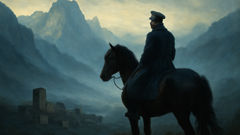Introduction
In the shadow of the Caucasus, where the mountains rise in sharp defiance against the sky and ancient winds sweep across wild meadows, the lives of men are carved by forces as relentless as the cliffs themselves. In the 1830s, this borderland between Russia and the unknown beckoned the restless and the broken. It was a place where the empire’s ambitions clashed with fierce local tribes, where dreams of glory and the ache of exile mingled on the wind. For Grigory Pechorin, an officer posted far from the salons of St. Petersburg, the Caucasus promised both escape and confrontation: escape from the stifling rituals of polite society, and confrontation with the emptiness he carried inside. Born into privilege yet haunted by a sense of futility, Pechorin had drifted through the world with a practiced indifference, his wit and charm a shield against disappointment. But here, beneath the storm-wracked skies and among people who lived and died by their passions, his detachment would be tested as never before. Tales would swirl around his name—of duels fought for nothing, of women ruined by a glance, of friendships turned to ash. In this land of towering peaks and ancient grudges, Pechorin’s fate would intertwine with those of soldiers, smugglers, lovers, and outcasts, each drawn to him by curiosity or hope or dread. Through five tangled episodes—each a thread in the tapestry of his life—he would come to embody the contradictions of his time: the yearning for meaning in an age adrift, the loneliness beneath a mask of bravado, and the cost of seeing too clearly. The winds of the Caucasus do not judge, but they remember. And so do the stories.
I. Bela
The road to Vladikavkaz twisted along the river’s edge, the water thick with spring melt and the echo of distant gunfire. Pechorin rode ahead of his company, his gaze detached, lips set in a wry half-smile as if daring the mountains to impress him. Around him, the landscape surged—fields of wild grass, villages of mud-brick and timber huddled against the elements, the ever-present roar of the wind. At the fortress, life pressed in. Officers played cards beneath battered icons, and laughter mingled with the rattle of sabers. Captain Maxim Maximych, a robust veteran with a fondness for stories, welcomed Pechorin with warmth untouched by cynicism. The old captain’s friendship was a balm against the cold indifference Pechorin wore like armor. But even Maximych’s hospitality couldn’t banish the sense of otherness that haunted Pechorin. Then Bela arrived—her name whispered in the smoke-filled barracks, her beauty lighting up the gloom of the officers’ mess. She was the daughter of a local chieftain, her dark eyes flashing with pride and fear, her laughter a rare melody. The officers wagered and boasted, but it was Pechorin who, with offhand charm, began to unravel her guarded silences. Their worlds collided in a summer heavy with possibility: moonlit walks beside the river, furtive meetings behind the old fortress wall. For Bela, love bloomed with reckless hope. For Pechorin, it was an experiment—a way to test the limits of his own heart. Yet as the days grew shorter, shadows crept between them. Pechorin’s initial passion cooled to curiosity, then to boredom; his caresses became distracted, his words tinged with irony. Bela’s spirit withered under his indifference. When tragedy struck—a vengeful rival’s knife, a frantic chase through the night—Pechorin’s mask slipped. For one brief, shattering moment, pain and guilt broke through. But as Bela’s lifeblood seeped into the earth, Pechorin could only watch, helpless, as loss hollowed him out. The fortress grew colder. Maxim Maximych’s stories faded, and Pechorin drifted once more, untouched by the lessons his own suffering might have taught. The mountains remained impassive, their silence echoing the emptiness inside him.
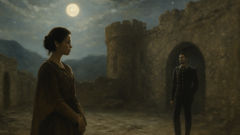
II. Maksim Maximych
Months passed. Pechorin drifted from post to post, his reputation growing—sometimes as a rake, sometimes as a hero, often as a man impossible to pin down. Fate brought him again to Maxim Maximych, who welcomed him in a mountain waystation battered by wind and nostalgia. The captain’s affection was undimmed. He offered vodka, laughter, and tales of the old wars, eager to rekindle their camaraderie. Yet Pechorin, ever distant, met warmth with cold courtesy. Maximych longed to bridge the gap, to remind Pechorin of shared danger and laughter. But Pechorin had grown harder, his wit sharper and his patience thinner. The world was a chessboard; even friendship was a move in a game he no longer enjoyed. One evening, as rain lashed the wooden walls and the fire sputtered, Maximych pressed an old keepsake—a worn handkerchief once belonging to Bela—into Pechorin’s hands. For a moment, Pechorin’s mask cracked. Regret flickered in his eyes. But habit won out. He shrugged off the captain’s concern, tossing the keepsake into his pack with a careless gesture. Maximych’s disappointment was palpable. As dawn broke, Pechorin departed without a backward glance. The old captain stood alone in the muddy courtyard, clutching his hat against the wind. The ache of friendship lost echoed louder than any cannon. For Pechorin, the pain was fainter—a dull ache he suppressed beneath new distractions—but it was real. The mountains took no sides, but the stones remembered every footstep, every word left unsaid.
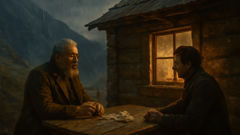
III. Taman
On assignment to the Black Sea coast, Pechorin arrived in Taman—a village perched between surf and sand, its streets twisted and half-submerged in fog. Here, the world seemed less real, as if caught between dream and waking. Local smugglers eyed the stranger with suspicion. Pechorin’s curiosity drew him into their secrets. He met a blind boy who navigated alleys with uncanny confidence, and a girl with sea-salt in her hair whose laughter was edged with danger. Nights in Taman were restless: ships signaled offshore, and deals were struck under cover of darkness. Pechorin, half-actor and half-sleuth, insinuated himself into their lives, driven less by duty than by a hunger to feel something—anything—beyond his own indifference. One night, following the girl to a moonlit cove, Pechorin witnessed a clandestine exchange. The line between hunter and hunted blurred. Betrayal hung in the air. The girl confronted him, her eyes wild with fury and longing. Words became threats, then pleas. Pechorin, amused and vaguely saddened, let her go—knowing her freedom came at the cost of his own sense of superiority. By dawn, the smugglers had vanished, leaving behind only footprints in the sand and a lingering sense of loss. Taman faded into memory, its mysteries unresolved. Pechorin, chastened but unchanged, boarded a coach for his next destination. The sea’s endless whisper reminded him that every secret left unsolved was another stone added to the weight he carried.
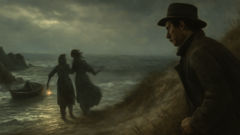
IV. Princess Mary
The spa town of Pyatigorsk shimmered in the mountain air, its promenades crowded with officers and debutantes fleeing the heat of Moscow. Pechorin arrived like a storm cloud on a summer afternoon, his reputation preceding him. Among the fashionable crowds, Princess Mary Ligovskaya’s beauty turned heads—her wit and poise drew admirers like moths to a lamp. Pechorin, amused by her pride, set out to conquer her heart as if it were a fortress to be stormed. He courted her with irony and dazzling conversation, each encounter a duel of intellects. But Princess Mary was more than a prize. Behind her bravado lay loneliness and longing for genuine connection. She found herself drawn to Pechorin’s darkness, even as she sensed the danger. Meanwhile, Vera—a woman from Pechorin’s past—reappeared. Married to another but still bound to him by old wounds and passion, Vera’s presence complicated everything. The triangle twisted tighter as Pechorin’s jealousy and self-loathing grew. A rival officer, Grushnitsky, saw in Pechorin both a friend and an enemy. Pride and suspicion led them inexorably toward a duel at dawn. The shot rang out beneath stormy skies. Grushnitsky fell; Pechorin survived, but not unchanged. Princess Mary wept for what might have been; Vera fled into exile, leaving only a note stained with tears. Pechorin lingered in Pyatigorsk, his triumph hollow. He had won the game but lost what little remained of his innocence. The town’s fountains gushed indifferently as he departed, pursued by memories he couldn’t outrun.
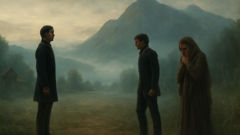
V. The Fatalist
The garrison at Stavropol was restless, rumors of rebellion swirling in the damp autumn air. Officers gathered in smoky taverns to debate philosophy and fate—could any man escape his destiny? Pechorin, drawn into these arguments, mocked the fatalists even as he courted danger. A wager was made: would a man survive if it was not his time? That night, a shot rang out in the alley; a fellow officer fell dead, and suspicion fell on everyone. Pechorin stalked the shadows, seeking answers not from justice but from curiosity. He found himself drawn to Vulich, a brooding officer convinced his end was near. When Vulich was killed in a senseless brawl—just hours after proclaiming his invulnerability—Pechorin felt both vindicated and shaken. The incident forced him to confront his own beliefs. Was he truly master of his fate, or merely a pawn in a game played by unseen hands? As autumn deepened and violence flared across the frontier, Pechorin’s cynicism soured into despair. The world offered no answers, only more questions. Yet even as he mocked the idea of destiny, he could not ignore the chill that crept up his spine whenever the wind shifted or a shadow crossed his path. In the end, Pechorin left Stavropol as he had arrived—in silence, his only companion the unrelenting ache of loss and the distant thunder of war.
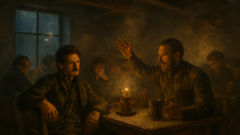
Conclusion
The mountains forget no one. In the wild borderlands where Russia’s ambitions meet the stubborn will of older worlds, Grigory Pechorin’s story endures—woven into local legend, whispered along caravan trails, etched into the stones of ruined fortresses. His adventures—by turns romantic, violent, absurd, and tragic—left scars not only on those who crossed his path but on his own restless soul. He loved fiercely, yet only fleetingly; he sought meaning, yet recoiled from it when it threatened to pin him down. Through loss after loss, through laughter that turned to regret and friendship that curdled into loneliness, Pechorin became a mirror of his era: brilliant and hollow, hungry for experience yet emptied by it. Those who remembered him—Bela’s grieving father, Maxim Maximych watching storms from a lonely post, Princess Mary gazing down from her balcony—carried his memory as a wound and a warning. For all his wit and charm, Pechorin remained an exile in his own life, never quite belonging to the world he wandered. In the end, perhaps that is what makes him a hero of his time—a man who saw too much, felt too deeply, and paid the price in sorrow and solitude. The winds of the Caucasus still carry his story, unanswered and unending.

